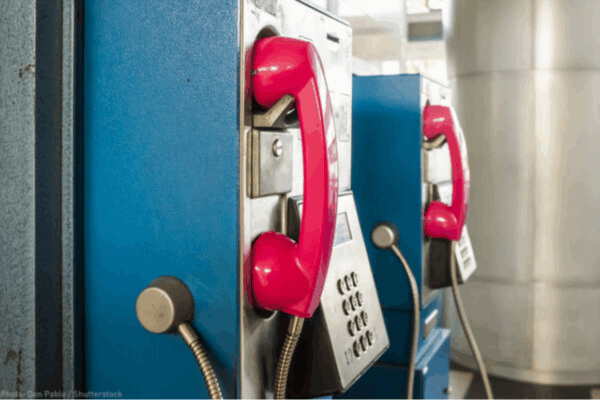This guest blog post was written by Alison Chaffin, vice president of Virginia Justice Alliance.
At Red Onion State Prison, 14 men have been on a hunger strike for weeks. I heard about it not from the news, but directly from my fiancé, Tay, who is serving time there.
To get that news, I had to pay. In fact, phone call fees to Virginia prisons are so expensive that it takes three jobs for me to afford my daily calls to Tay. That’s why I’m so anxious to see a bill move through the General Assembly, SB378/HB801, that would end corporate profiteering off prison communications.
Virginia’s Department of Corrections (VDOC) charges exorbitant prices for phone calls, emails, and video visits: more than double what people typically pay outside. Vendors who provide those services aren’t charging more because they have to. They’re doing it because they can.
As a special education teacher, I provide individualized instruction and craft personal plans for educational success – but I don’t make a lot of money.
We need phone calls. We need SB378/HB801. There is no price I wouldn’t pay to ensure we all get to connect with Tay. But I shouldn’t have to work three jobs to do it.
Inside prison, Tay works, too. But the maximum prison paycheck of $54 a month won’t cover anything beyond hygiene items. So I step up. On top of my day job as a special education teacher, I work a second and third job, as a tutor and adjunct professor.
I do it because I have to. Phone calls are the only way Tay can still be Dad to his ten year old son. It’s the only way he can still be a son, grandson, brother, and partner to me: educator burn-out is extremely common, and talking to my support system, the person who gets me through my toughest days, is critical to my well-being.
It’s also critical to his. These calls provide Tay with hope and purpose in a dark place, motivating him to avoid trouble and be a positive influence to his younger siblings. They help him make productive plans for his future.
Studies show other families see the same benefits we do. An Ormiston Children and Families Trust report found maintaining strong family connections during incarceration improved well-being and coping for kids and family members like us. Researchers at both University of Wisconsin and William & Mary found that kids with incarcerated parents saw reduced depression, anxiety, and behavior problems – plus better grades and school attainment – just from getting to talk to them. In our family, I’ve seen the smiles that getting to tell Dad about school days and sporting events brings.
Studies show incarcerated people like Tay see benefits, too. Research from both Stonehill College and Grinnell College found misbehavior declines for those who stay connected with loved ones. That means safer facilities for everyone, including correctional staff.
And studies by both Ormiston and RTI International found benefits down the road, too, like reduced recidivism, stronger familial bonds, more stable housing and employment, and fewer problems with substances and the law after release.
So it’s worth doing whatever it takes to be able to afford phone calls. But it takes a toll on my well-being: Prison Policy Initiative found life expectancy drops 2.6 years when your loved one is locked up. High fees is one reason why.
The reality is, there’s no structural reason it should take three jobs to afford calling your incarcerated loved one. According to a 2022 Department of Corrections report on communications fees, it would take only 0.33 percent of VDOC’s current $1.5 billion budget to fully fund calls for incarcerated people and their families.
That’s less than one percent: less than one percent to strengthen families, reduce crime and improve safety for everyone inside prisons. That costs much less than existing programs that have far fewer benefits.
No one should be exploited for profit, especially not the families of people who are incarcerated. But without a bill like SB378/HB801, we are. No wonder an Ella Baker Center study found that one-third of families with a loved one behind bars go into debt to stay connected: for me, there’s no other option. Our last visit from Alexandria to Red Onion State Prison, located in the remote Appalachian Mountains, took all weekend, cost $1200, and lasted only two hours.
We need phone calls. We need SB378/HB801. There is no price I wouldn’t pay to ensure we all get to connect with Tay. But I shouldn’t have to work three jobs to do it.
Saying I love you shouldn't cost a thing.

